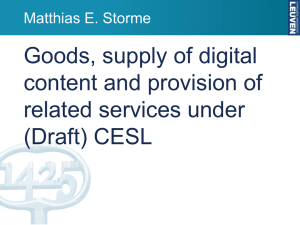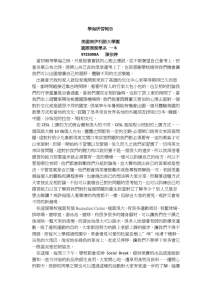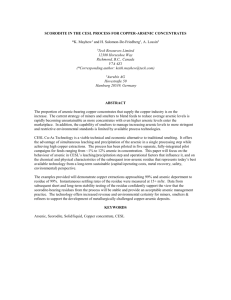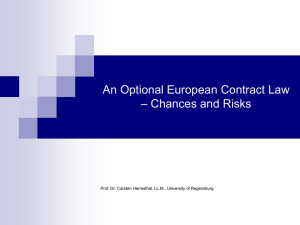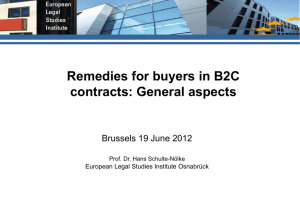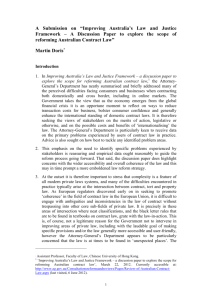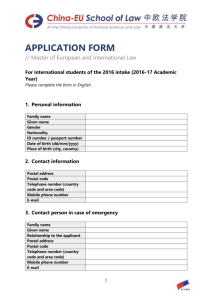presentation-cpl--
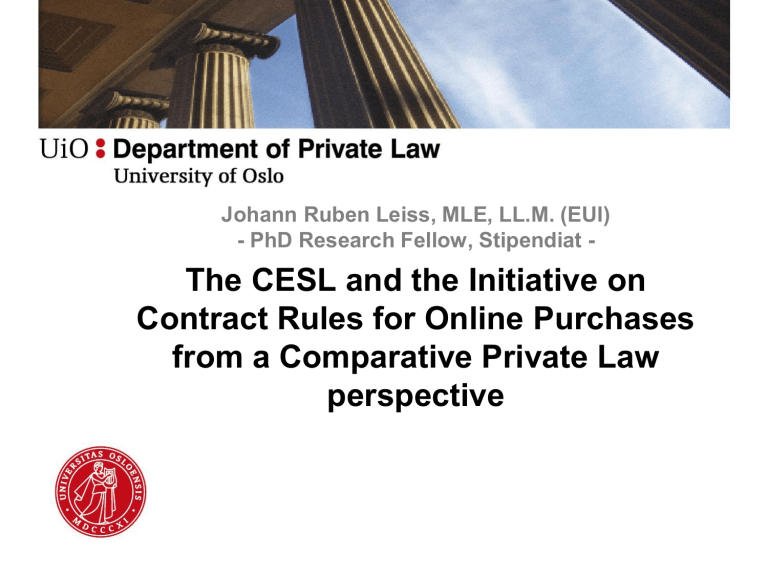
Johann Ruben Leiss, MLE, LL.M. (EUI)
- PhD Research Fellow, Stipendiat -
The CESL and the Initiative on
Contract Rules for Online Purchases from a Comparative Private Law perspective
Outline of the Lecture
• Introduction
• Background to the Proposal for a Common
European Sales Law (CESL)
• The Content of the CESL – An Overview
• A German Perspective to the CESL
• Exercises
• Initiative on Contract Rules for Online Purchases
• Reflections Legal Harmonisation and Comparative
Law – Problems and Prospects
Introduction
• Why do we deal with European Law in a course on
Comparative Private Law?
o The existence of many different legal systems o 28 Member States of the EU o 28 different Laws on Sales Law
Introduction
• Why do we deal with European Law in a course on
Comparative Private Law?
o The existence of many different legal systems o CESL as a means to overcome the challenges that also comparative private law tries to overcome.
o Comparative Private Law was most relevant in the drafting process o Comparative Private Law is relevant for the evaluation of the quality of the European sales law o the socalled “opt-in” mechanism – requires careful comparative legal analysis for any party who may want to make use of the
CESL o it serves as an intellectual exercise
Background to the CESL
Article 3 (I) of the Rome I regulation
A contract shall be governed by the law
chosen by the parties. The choice shall be made expressly or clearly demonstrated by the terms of the contract or the circumstances of the case. By their choice the parties can select the law applicable to the whole or to part only of the contract.
Background to the CESL
Article 6 (1) and (2) of the Rome I Regulation
1. Without prejudice to Articles 5 and 7, a contract concluded by a natural person for a purpose which can be regarded as being outside his trade or profession (the consumer) with another person acting in the exercise of his trade or profession (the professional) shall be governed by the law
of the country where the consumer has his habitual residence [ …]
2.
Notwithstanding paragraph 1, the parties may choose the law applicable to a contract which fulfils the requirements of paragraph 1, in accordance with Article 3. Such a choice may not, however, have the result of depriving the consumer of the protection afforded to him by provisions that cannot be derogated from by agreement by virtue of the law which, in the absence of choice, would have been applicable on the basis of paragraph 1.
Background to the CESL
Article 114 (1) of the TFEU:
Save where otherwise provided in the Treaties, the following provisions shall apply for the achievement of the objectives set out in Article 26. The European
Parliament and the Council shall [ …] adopt the measures for the approximation of the provisions laid down by law, regulation or administrative action in
Member States which have as their object the establishment and functioning of the internal market.
Background to the CESL
Article 26 TFEU (to which Article 114 refers) :
1. The Union shall adopt measures with the aim of establishing or ensuring the functioning of the
internal market, in accordance with the relevant provisions of the Treaties.
2. The internal market shall comprise an area without internal frontiers in which the free movement of goods, persons, services and capital is ensured in accordance with the provisions of the Treaties.
Content of the CESL
Article 3 of the CESL:
The parties may agree that the Common
European sales law governs their cross-border contracts [ ….].
Content of the CESL
• http://ec.europa.eu/justice/contract/CESLdemo/CESL1-Oct1-2.htm
Alternatives to the Opt-in mechanism
1. Option: the publication of the work of the Expert
Group
2. Option: introduction of a toolbox
3. Option: a commission recommendation on European
Contract Law
4. Directive establishing a European Contract law
5. Option: Regulation establishing a European Contract
Law
6. Option: Regulation establishing a European Civil
Code
7. Option: Regulation with opt-in mechanism
Content of the CESL
Article 4 (1) and (2) of the CESL
1. The Common European Sales Law may be used for cross-border contracts.
2. For the purposes of this Regulation, a contract between traders is a cross-border contract if the parties have their habitual residence in different countries of which at least one is a Member State.
Content of the CESL
Article 7 (1) of the CESL
The Common European Sales Law may be used only if the seller of goods or the supplier of digital content is a trader. Where all the parties to a contract are traders, the Common
European Sales Law may be used if at least one of those parties is a small or medium-
sized enterprise ('SME').
Content of the CESL
According to Article 7 (2) of the regulation a small or medium enterprise is a trader
(a) employs fewer than 250 persons; and
(b) has an annual turnover not exceeding EUR 50 million or an annual balance sheet total not exceeding
EUR 43 million, or, for an SME which has its habitual residence in a Member State whose currency is not the euro or in a third country, the equivalent amounts in the currency of that Member State or third country.
Table of Content
Chapter I: Introductory Provisions
Chapter II: Making a binding contract
Chapter III: Assessing what is in the contract
Chapter IV: Obligations and remedies of the parties to the sales contract
Chapter V: Obligations and remedies of the parties to a related service contract
Chapter VI: Damages and interests
Chapter VII: Restitution
Chapter VIII: Prescription
Content of the CESL
• Fields that are not covered, e.g.: o The law on assigment (Abtretung von Ansprüchen aus
Kaufverträgen) o The law on off-setting of claims (Aufrechnung von Ansprüchen
aus Kaufverträgen) o Legal representation in (Stellvertretung) o (Höhe zu zahlender Zinsen) o Securities in the trading of good (Warenkreditsicherung,
insbesondere Eigentumsvorbehalt) o Contractual capability (Geschäftsfähigkeit) o Transfer of ownership
A German Perspective
Article 2 (b) of the Annex to the CESL
Definitions
For the purpose of this Regulation, the following definitions shall apply [ …] ‘good faith and fair dealing’ means a standard of conduct characterised by honesty, openness and consideration for the interests of the other party to the transaction or relationship in question
[ …].
A German Perspective
Article 2 of the Annex to the CESL
Good faith and fair dealing
1. Each party has a duty to act in accordance with good faith and fair dealing.
2. Breach of this duty may preclude the party in breach from exercising or relying on a right, remedy or defence which that party would otherwise have, or may make the party liable for any loss thereby caused to the other party.
3. The parties may not exclude the application of this
Article or derogate from or vary its effects.

